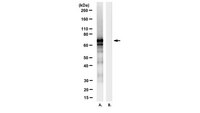MAB131884-100UL Sigma-AldrichAnti-BASE-tag Antibody, clone 7C7
Anti-BASE-tag, clone 7C7, Cat. No. MAB131884, is a mouse monoclonal antibody that recognizes the epitope QPAKKRLNFGQTGD and has been tested for use in Western Blotting, Immunoprecipitation, and Immunofluorescence.
More>> Anti-BASE-tag, clone 7C7, Cat. No. MAB131884, is a mouse monoclonal antibody that recognizes the epitope QPAKKRLNFGQTGD and has been tested for use in Western Blotting, Immunoprecipitation, and Immunofluorescence. Less<<Recommended Products
Přehled
| Replacement Information |
|---|
Tabulka spec. kláve
| Species Reactivity | Key Applications | Host | Format | Antibody Type |
|---|---|---|---|---|
| Virus | WB | M | Purified | Monoclonal Antibody |
| References |
|---|
| Product Information | |
|---|---|
| Format | Purified |
| Presentation | Purified mouse monoclonal antibody IgG2b in buffer containing 0.1 M Tris-Glycine (pH 7.4), 150 mM NaCl with 0.05% sodium azide. |
| Physicochemical Information |
|---|
| Dimensions |
|---|
| Materials Information |
|---|
| Toxicological Information |
|---|
| Safety Information according to GHS |
|---|
| Safety Information |
|---|
| Storage and Shipping Information | |
|---|---|
| Storage Conditions | Stable for 1 year at 2-8°C from date of receipt. |
| Packaging Information | |
|---|---|
| Material Size | 100 µL |
| Transport Information |
|---|
| Supplemental Information |
|---|
| Specifications |
|---|
| Global Trade Item Number | |
|---|---|
| Katalogové číslo | GTIN |
| MAB131884-100UL | 04054839563393 |
Documentation
Anti-BASE-tag Antibody, clone 7C7 Certificates of Analysis
| Title | Lot Number |
|---|---|
| Anti-BASE-tag, clone 7C7 - 3768057 | 3768057 |
| Anti-BASE-tag, clone 7C7 - 4070053 | 4070053 |
| Anti-BASE-tag, clone 7C7 Monoclonal Antibody | Q3100261 |










